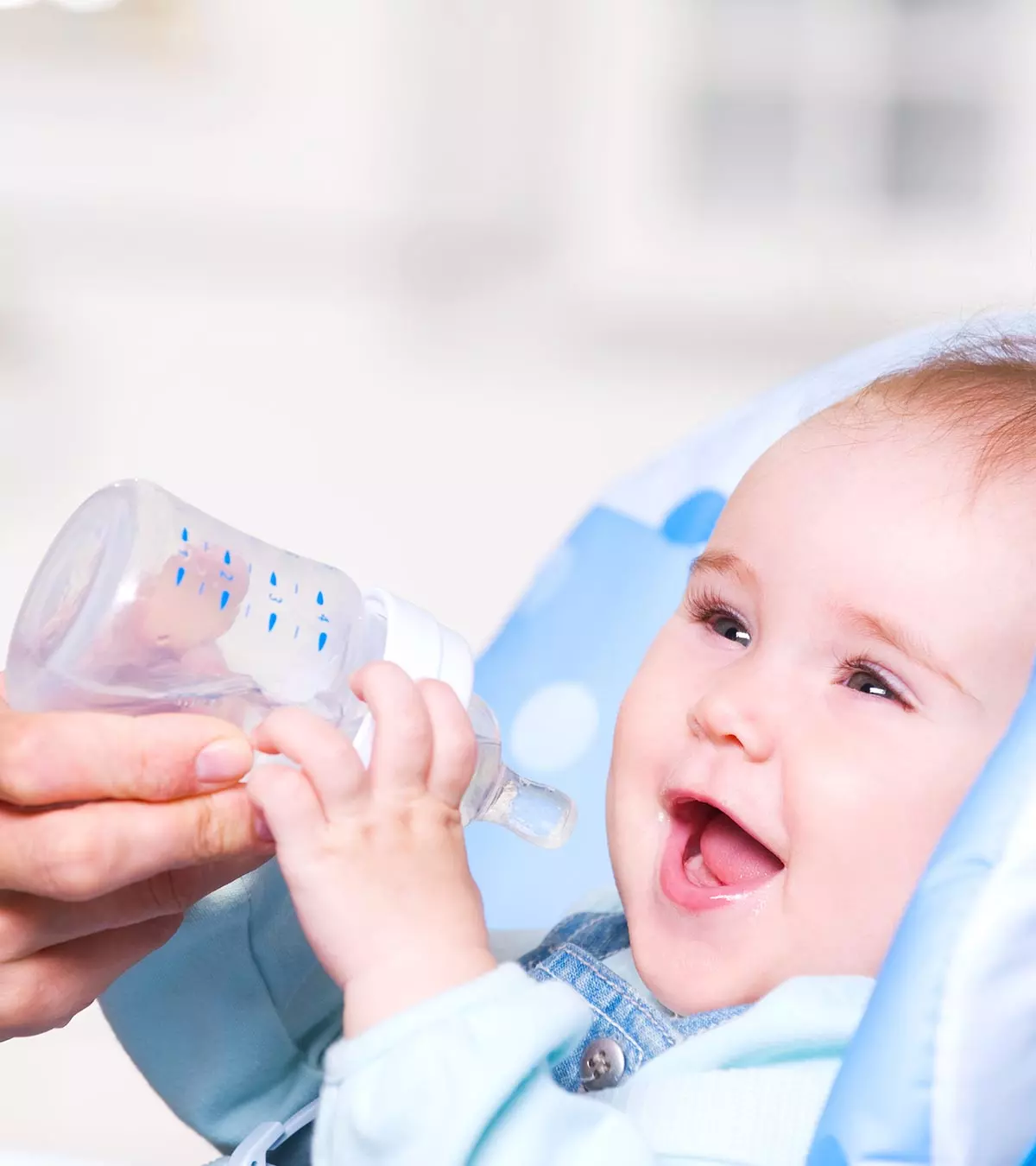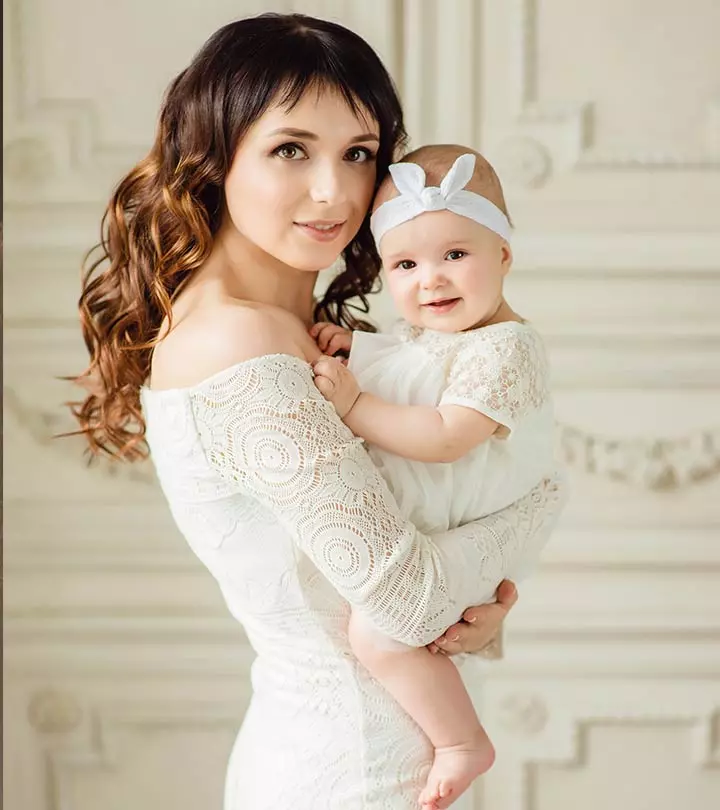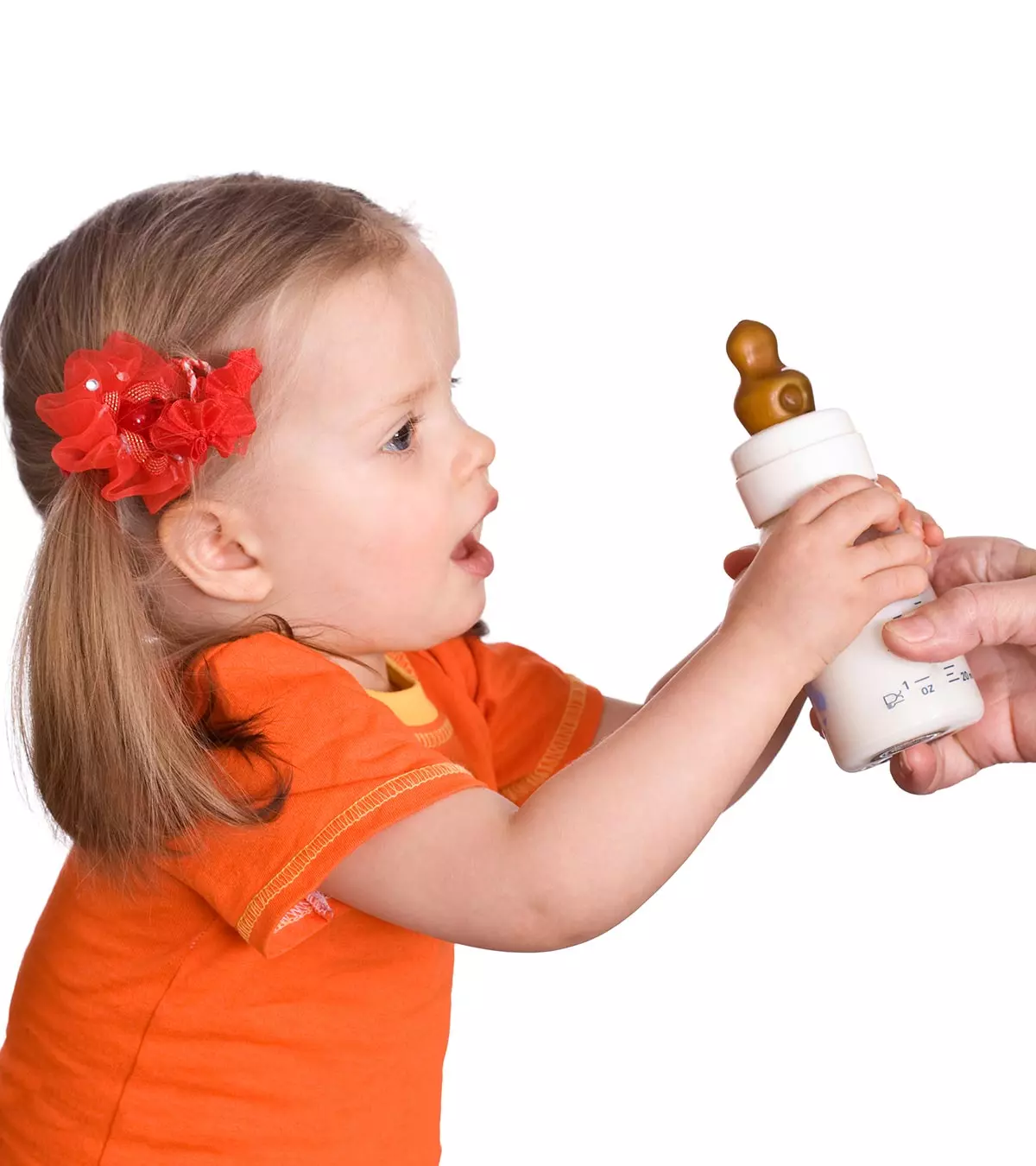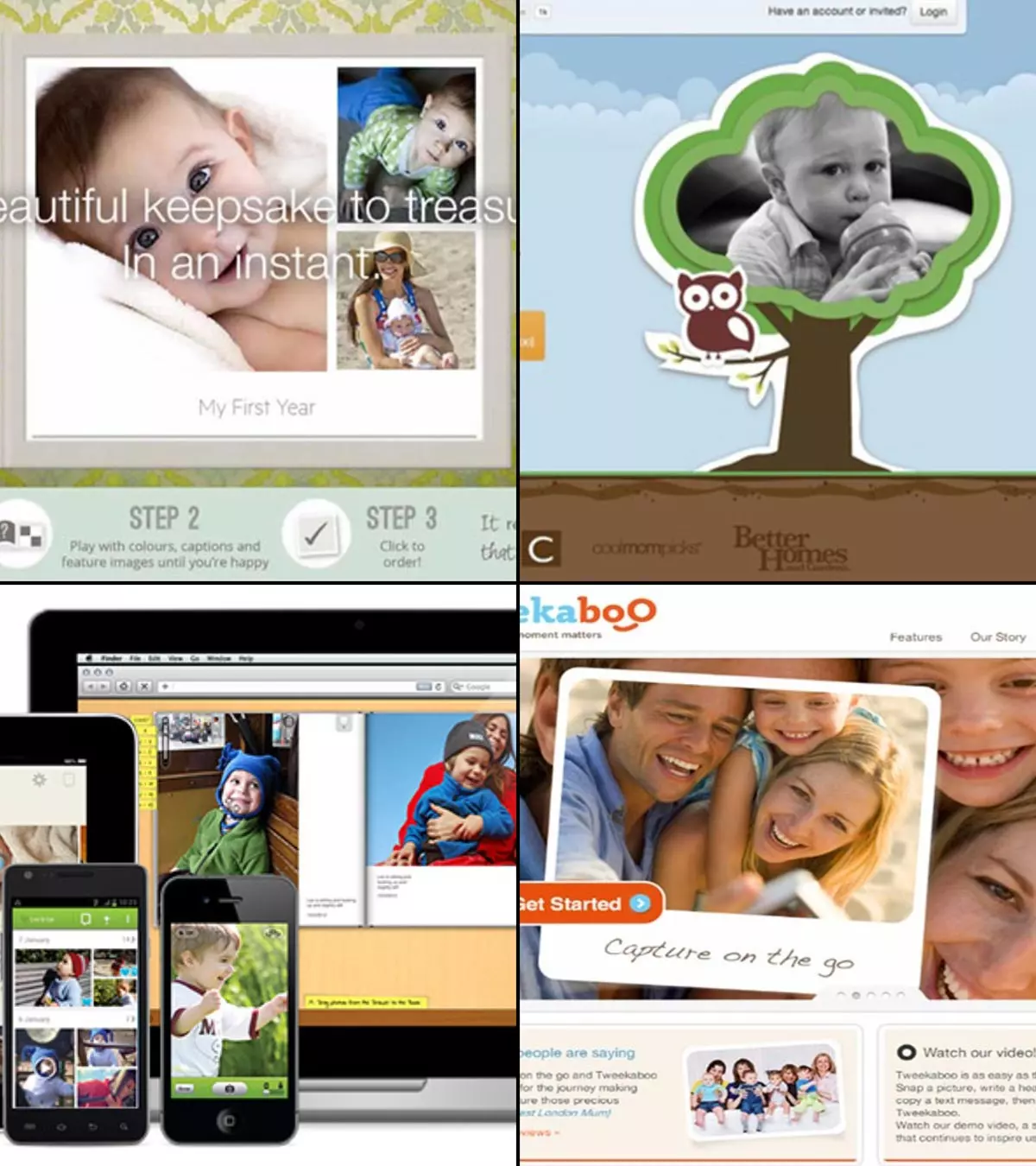
Image: iStock
Whether you are joining work after a long maternity leave or want your little one to meet new people outside of family and socialize, choosing between sending them to a preschool or daycare can be a tough task. So, if you want to compare preschool Vs. daycare and decide where to send your ward, this post is for you.
Preschool and daycare have different objectives and look after your child differently. Either way, you want your child to be taken care of by loving people so that they don’t miss you and have a hard time spending time away from you. Read on to know the best option for your child.
Key Pointers
- Preschools and daycares serve different purposes, with preschools emphasizing early childhood education and daycares emphasizing childcare.
- Preschools are best for kids aged 2.5 to 5 years, while daycares may accommodate kids of all ages, from infants to older children.
- Preschools typically operate for 3 to 4 hours, whereas daycares operate for longer hours (8 to 9 hours).
- The choice between a preschool and a daycare depends on individual demands and requirements, including the child’s age and the parent’s work schedules.
- Factors to consider when selecting a preschool or daycare include distance from home/workplace, cost, safety, center objectives and methods, education, formal staff training, and the caretaker-child ratio.
What Is A Preschool?

A preschool, otherwise known as a pre-primary or play school, is a learning place that offers early childhood education to children before they start elementary school.
Ideally, children who have crossed the toddler age (2 ½ to 5 years) qualify for preschool. It focuses on the child’s development and lays the foundation for later school years.
 Quick fact
Quick factWhat Is A Daycare?
A daycare or creche is a place that provides childcare services. Daycare centers mainly cater to working parents and focus on taking care of the children, feeding them, putting them to sleep, and making them play for some time.
It is typically for younger children (infants to 12 years) who have to spend five to eight hours away from home, but older children also go to daycare after school hours (1).
A preschool is different from a daycare in many ways, but they have some similarities as well. Read on to know what they are.
Preschool Vs. Daycare
| Preschool | Daycare |
|---|---|
| Focus is on the child’s education and development | The child’s development is not the top priority here. Instead, the focus is on taking care of the child and keeping them active |
| Doesn’t open during the holidays | Works during the holidays as well |
| Caters to the age group of 2.5 – 5 years | Is suitable for a wide age group – from infants to older children |
| Open for shorter hours usually for three to four hours | Provides full-time care and is open for a longer duration, usually for eight to nine hours |
| Typically has day-scholars | Typically has children of working parents |
| Different preschools have different methodologies such as Montessori, Waldorf, Reggio Emilia, play-based and religious models | It has free-play, nap time, and informal learning |
Similarities Between Preschool And Daycare
When weighing your options between preschool vs. daycare, remember that both preschool and daycare can offer opportunities for growth and exploration. In addition, they can offer opportunities for creativity.
- Several preschools have an extended daycare, where the children can stay back after school hours.

- Daycares and preschools require childcare licensing and accreditations to run them. To receive these licenses, these facilities have to pass certain health and safety requirements set by the state or territory government (2).
- The safety of the children is a top priority in both cases.
- They need to have qualified and trained staff to educate and train the children. The fee structure is almost the same (2).
If your toddler is ready to stay away from you for a few hours, you need to choose between a preschool and a daycare and the next section will help you make the choice.
 Did you know?
Did you know?Preschool Or Daycare – What To Choose?
Catherine Moore, early childhood development specialist from New Jersey, says, “Preschool is typically the better option for early learning and school readiness, as it follows a structured curriculum designed to enhance cognitive, social, and emotional development. Daycare, on the other hand, provides a nurturing and flexible environment, primarily focused on childcare needs rather than formal education.”
The major difference between preschool and daycare is the level of socialization and nurturing that is provided. This is an individual decision and depends on your familial requirements.
- Daycare may be suitable for working parents as it offers childcare services for longer hours.
- If your child is too young, then you might want to opt for a daycare.
- If your child is a toddler, and it’s time for them to be initiated into formal learning, preschool might be a better choice as it prepares them for kindergarten (1).
- Also, a preschool is the right place if you want your child to interact and play with the same-age kids.
Whether your choice is a daycare or a preschool, you need to prepare a set of criteria for the center to meet.
The female population in the labor force has been declining over the years, and the rising childcare in the US could be one of the reasons for it. According to a survey conducted by the Center for American Progress, in the US, more mothers would want to resume work or opt for higher education if they had access to good childcare.
The chart below shows that 20% of stay-at-home mothers would like to work, while 42% would want to look for higher-paying jobs. Sadly, women have opted out of their careers due to the lack of federal child care and paid family leaves.

Proportion of US children diagnosed with developmental disabilities (2015-2018)
Source: U.S. children diagnosed with a developmental disability; Statista/NCHS/CDCFactors To Consider While Choosing A Preschool/ Daycare
Determine what you want for your child and your expectations from the preschool/ daycare. Here are a few things you may consider before taking a decision:
1. Distance
See how far the center is from your home/workplace.
- If it is a daycare, choose the one closer to your work so that you can drop your child off before you go to work and pick them up right after work.
- If it is preschool, it is good to have it near your house.

2. Time spent
Decide how many hours you want your child to spend in preschool/ daycare.
Usually, preschools operate from 9 am to 12 pm or from 8 am to 3 pm, and daycares operate from 8 am to 8 pm or 7 am to 6 pm (1).
3. Preschool-cum-daycare
Some preschools have daycares attached to them to provide childcare services after school hours.
- If you are considering a preschool with an attached daycare, you need to find out about the transition period from preschool to daycare. What happens when most of the kids leave and your child is alone?
- If you are dropping your child at daycare even before the caretakers’ arrive, you need to know whom to give instructions about your child.
4. Curriculum
The preschool curriculum focuses on early life education while a daycare focuses on childcare services along with education and play.
- Preschool years represent a time of great psychological, behavioral, and cognitive growth for toddlers (3). So, the center should engage the child and help in their cognitive, physical, social, and emotional development.
- A preschool should introduce a language, phonetics, letters, numbers, environmental sciences, and culture-specific concepts to the child.
- Children learn best through play; so there should be a combination of free play and structured play.
- If the preschool is pressurizing the children with lots of homework, you might not want to enroll your child in such a school.
- Check if the activities are age-appropriate.
- The teacher-child relationship should be healthy. If the child is too scared of their teacher, it’s not a good sign.
5. Education and formal training of staff
Preschool staff undergo any formal training, while the same may not be the case with the daycare staff. Most preschools have a set of requirements that their employees have to meet.
- The employees of a preschool are, usually, selected on the basis of their approach to children and the methods of teaching they use for a certain age group.
- A daycare is more relaxed in its approach towards the teachers and staff. In most cases, the staff do not have to attend an examination or interview to get recruited.
- In most states, the educational qualification required of a daycare staff is lower than that of a preschool employee.
6. Teacher-child interaction
You need to check the qualification of the teachers/ caretakers, their experience, and their attitude towards the children.
- A happy teacher/ caretaker will make a happy child. The teacher-child interaction should be affectionate and respectful.
- If the children are engaged in activities and the teacher is preoccupied with something else, don’t assume that she is not responsible. Effective teachers encourage the children to be independent and resolve their conflicts, while they keep an eye on them and interfere when required.

7. Fees and payment method
This is one of the more important points to consider.
- How much does the center charge? If their fee structure is too high, do they offer the convenience of installments? Is there any late fee policy?
- How does the daycare charge for the additional hours?
- Are there any extra charges for the snacks or activities?
8. The ratio of caretaker to children
According to the National Association for the Education of Young Children (NAEYC), there should be a 1:4 to 1:6 ratio of caretakers to children up to 36 months, and a 1:10 ratio of educators to children in preschool (4). It’s fair for you to expect one-on-one attention on your child at the center. So, check if:
- Your child gets the attention even when there are too many kids. Especially if it’s an infant, they need to keep an eye on him constantly.
- Select a preschool/ daycare where the teacher/ caretaker-child ratio is low.
9. Diaper rules
Diapers are necessary for preschoolers and infants.
- Most preschools are strict in their diaper policies and require your child to be potty trained before they start classes. But in daycares, potty training is part of childcare.
- If the child is already diaper-trained, it could be a bonus for you as there will not be any problems in starting a preschool.
- Most daycare centers take in children who are still in diapers, as they also care for younger babies who are not yet potty trained.
- Whether you are about to begin potty training your child or are already in the middle of it, you can still send your child to daycare and continue with the training at home.
10. Be aware of the daily routine
Remember that your child needs to be happy and comfortable with the general routine at the center.
- Do they have activities such as storytelling, playtime, and dance or music?
- What is their snack time, study time, and playtime?
11. Food allergies
If your child has any food allergies, you need to inform the preschool/ daycare personnel.
- Check how they are going to manage if your child develops any allergies.
- Do they have a nurse or a doctor in case of emergencies?
12. Tracking milestones
Your child will be spending some time away from you.
- You need to check with the preschool/ daycare if they have any program to track the child’s milestones.
- You also need to keep the daycare personnel informed about the milestones your child is likely to reach during that specific time.
13. Interaction with other children
How do the centers facilitate social interaction and interpersonal interaction?
- Children in daycares are exposed to a mixed age group of kids. So, they get an opportunity to socialize with everyone including caretakers.
- Interaction in preschools is limited to their age group of kids and teachers.
So, you must have gotten an idea of where you want to put your child. But before you finalize it, make a note of a few more points.
 Point to consider
Point to considerThings To Remember
Once you have decided whether you want your child to attend a preschool or daycare center, you must make some inquiries about the facility before admitting your child (5). Here are a few important things to consider:
- The atmosphere: Check out the preschool and daycare center options near your home or workplace and ask yourself which feels better.
- Nature of the staff: Talk to the preschool/ daycare head, teachers, and caretakers. Would your child instantly like them or seem intimidated or scared?

- Hygiene and safety: Take note of the environment and hygiene of the place — ventilation, safety, baby-proofing, etc. Ask if there is a code required to access the building or the areas where the children are.Enquire about their child-proofing mechanisms as well.
- Qualifications of the staff: Consider the training and credentials of the instructors or caretakers when deciding between preschool vs. daycare. If it is a daycare, ask if their caregivers have training for emergencies, such as CPR training, and if it is a preschool, inquire about the teachers’ background and the school curriculum.
The teachers’ experience have a direct impact on your child’s development. According to a study on children aged between 6 to 24 months in Peru conducted by researchers from the Inter-American Development Bank (IDB), “Children assigned to more experienced caregivers, and caregivers that display better interactions with children have higher development outcomes (6).”
- Cleanliness and safety of toys: What toys do they have? Is it safe to play with them? Also, look out for how and how often the toys are cleaned.
- Sick policy: What is the sick policy for children in the daycare or preschool? Some schools require children to stay home till they are better or the doctor gives them an all-clear. Moreover, ask about the vaccinations your child and their instructors are required to have.
- Hidden fees and supplies: Ask about the supplies you may need to provide. Besides food for your child, a change of clothes, and diapers, some preschools ask parents to help with school supplies and snacks for the class. You may need to account for this as a “hidden fee” for the school.
- Teaching policies and progress reports: Ask the teachers and staff about the teaching policies they adopt. Ask them how they deal with children, even with those who may be difficult to handle. Also, ask them how frequently you can expect progress reports from them, whether it is weekly or monthly.
- Timings: Compare the center’s timings with your work timings or weekend schedule.
- The age group of the children: Look at the age of the children who are attending the preschool/ daycare. Do you want your child to mingle with the age groups you see?
- Feedback from guardians: Interact with the parents who come to collect or drop their children at the center. Take feedback from them, and find out if they are working parents or just leaving the kids there for some social interaction.
- Daily routine: Find out about the activities offered at the centers. Do you feel the activities will be a great learning tool for your child? Learn about their day-to-day activities and their daily structure.
- Attitude of the children: Take a look at the children who are leaving the center at the end of the day. Do they seem happy and well-cared? Or do they seem tired, disinterested, or bored? Do the children turn back happily and wave to the staff or do they just rush out and want to go home? Their reactions will tell you all you need to know about the facility and its staff.
- Compliance with rules and laws: Check if the center is following the rules stipulated by the state. Do a background check to know if the centers are being run legally. Check the ratings, get referrals, and inquire about them.
Deciding between preschool and daycare involves effort and research since each family has its unique requirements. Karessa, a mother and blogger, remarks that she enrolled her children in preschool to promote their social skills and confidence. She says, “We have enrolled Kinley and Kruz (the children) in a preschool that has wonderful reviews, is actually the most affordable in the area, and was highly recommended by friends that we totally trust! The administrators, teachers, and fellow parents were all so kind when we visited, and it feels like a great fit. I realize that them getting out and socializing with children their age is the entire point of preschool (i).”
Regardless of which option a family chooses, both preschool and daycare can offer valuable opportunities for socialization, nurturing, growth, exploration and creativity that can have a positive impact on a child’s development.
Frequently Asked Questions
1. How do I know my child is ready for preschool?
You may know your child is ready for preschool if they are (7):
- Independent and can engage in activities for some time without supervision
- Expressive and can convey their needs and wishes
- Attentive and can focus and follow directions
- Emotionally ready to stay away from parents or caregivers
- Physically strong to sustain the daily routine
- Toilet-trained
2. Why should parents send their children to preschool?
There are several advantages of a preschool. Children send their children to preschool because these schools (8):
- Allow them to learn new things and grow
- Prepare them for kindergarten
- Focus on their social and emotional development
- Develop the habit of following a routine and being in a structured environment
- Teach them to care for themselves
- Nurture their curiosity
3. How much should I expect to pay for preschool or daycare?
The overall pay for preschool varies depending on several factors, such as the neighborhood, types of facilities, programs available, the school’s popularity, the state you reside in, and family income. The prices may also vary based on whether the facility is public or private.
4. How do I prepare my child for their first day of preschool or daycare?
Visit the preschool or daycare before their first day to help the child familiarize themselves with the environment. Talk to your child about what preschool or daycare is and answer any questions they may have. Watch videos or TV shows that feature characters going to preschool, which can help build familiarity. Share experiences about your first day of school and arrange for playdates with children from the same preschool or daycare before the first day to help the child better understand the transition (9).
5. How can I stay involved in my child’s education and development in preschool or daycare?
Establish a strong communication link with the teachers to stay informed about the child’s progress. Participate in school activities to interact with the teachers, staff, and other parents. Help your child with homework, read with them, and discuss their time at preschool or daycare. Additionally, regularly review your child’s work or assignments to help them share their learning and experiences.
The debate on preschool vs. daycare is a difficult one to address as both have their pros and cons. Make sure that the daycare or the preschool facility is at a feasible distance from your house and that the staff is professional. It is also advised that you talk to the parents of the children already attending the institution to know better about their policies and management techniques. These institutions are your child’s first step into the social world, and it is essential that you choose the right one.
Infographic: Factors To Consider When Choosing A Preschool/ Daycare
Whether it is a preschool or daycare, you want a convenient place for you and your child. If you are off to work soon and need to find a center to keep your child safe while you are away, here are a few important factors to consider when choosing an ideal preschool or daycare. Illustration: Momjunction Design Team
Illustration: Preschool Vs. Daycare: Which One Is Better?
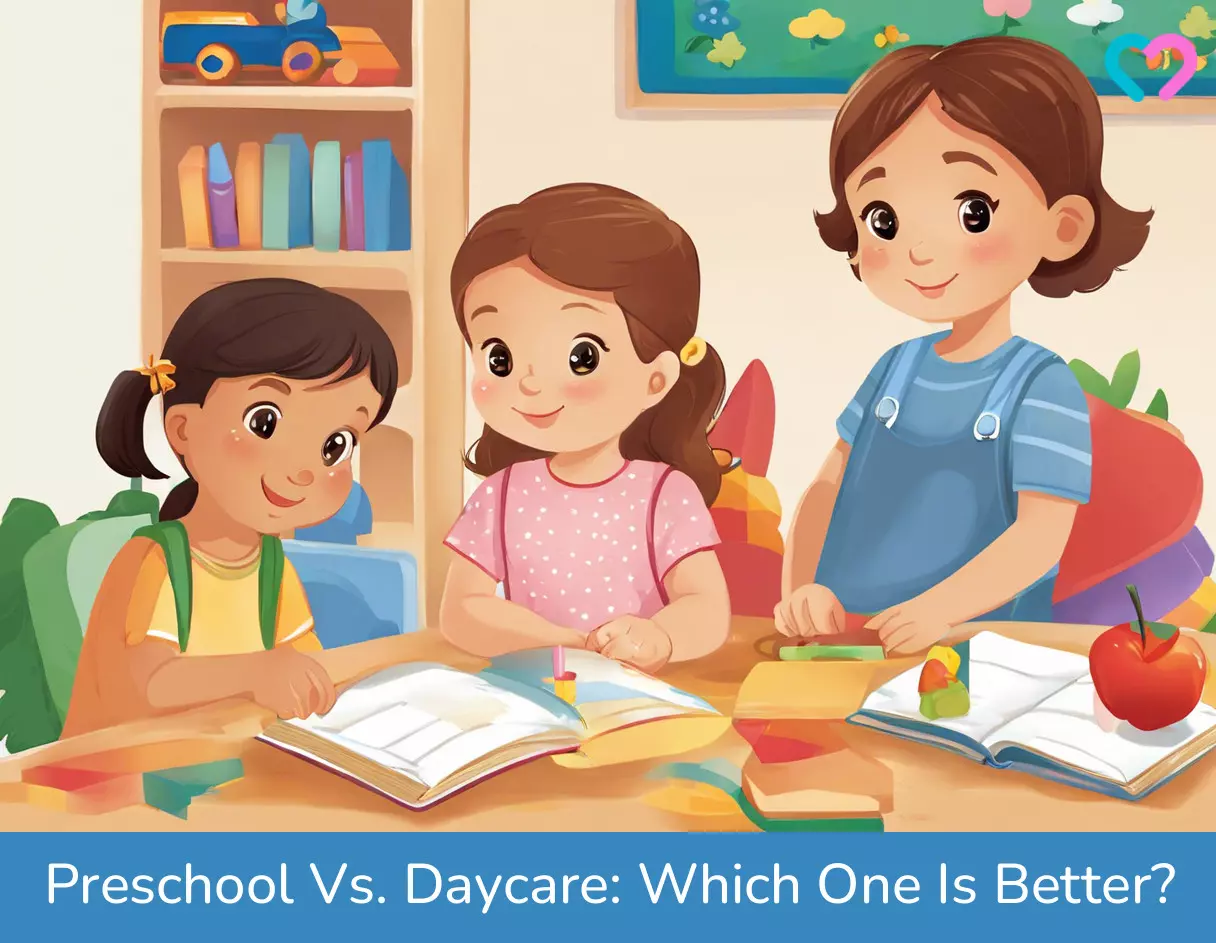
Image: Stable Diffusion/MomJunction Design Team
Personal Experience: Source
MomJunction articles include first-hand experiences to provide you with better insights through real-life narratives. Here are the sources of personal accounts referenced in this article.
i. Preschool or glorified daycare?.https://thetrupes.wordpress.com/2014/07/30/preschool-or-glorified-daycare/
References
- Daycare vs. Preschool: The Go-To Guide for Parents.
https://www.rasmussen.edu/degrees/education/blog/daycare-vs-preschool/ - What is child care licensing?
https://childcare.gov/consumer-education/child-care-licensing-and-regulations - Timothy T. Brown et. al.; (2012); Brain development during the preschool years.
https://pmc.ncbi.nlm.nih.gov/articles/PMC3511633/ - Staff-to-Child Ratio and Class Size.
https://www.naeyc.org/sites/default/files/globally-shared/downloads/PDFs/accreditation/early-learning/staff_child_ratio_0.pdf - 10 Must-Ask Questions and Tips on Choosing a Preschool.
https://www.hopkinsmedicine.org/health/wellness-and-prevention/10-must-ask-questions-and-tips-on-choosing-a-preschool - Maria Caridad Araujo et. al.; (2017); Child Care Quality and Child Development.
https://www.researchgate.net/publication/316108843_Child_Care_Quality_and_Child_Development - How to know if your child is ready for preschool.
https://www.understood.org/en/articles/how-to-know-if-your-child-is-ready-for-preschool - 10 good reasons your child should attend preschool.
https://www.greatschools.org/gk/articles/why-preschool/ - How to prepare your child for preschool.
https://www.unicef.org/parenting/child-care/how-prepare-your-child-preschool - Learning is Fun at Kinder School.
https://unitasccc.org/learning-is-fun-at-kinder-school/ - Social Welfare History Project The History of Child Care in The U.S.
https://socialwelfare.library.vcu.edu/programs/child-care-the-american-history/ - Montessori Education.
https://montessori-nw.org/about-montessori-education?gad_source=1&gclid=CjwKCAiAqrG9BhAVEiwAaPu5znZ4sfr9V7ZTS1V51xg2RFz_bmAQ7d5RJWJFT4aJzmhDA8aCqqTzXRoCQ1wQAvD_BwE
Community Experiences
Join the conversation and become a part of our nurturing community! Share your stories, experiences, and insights to connect with fellow parents.
Read full bio of Shreshtha Dhar
- Catherine Moore is an early childhood development specialist, professional nanny, a certified newborn care specialist, and an NJ-licensed special education full-time teacher. Her 25 years of professional experience includes providing care and education to children, including infants. Catherine also specializes in early intervention developmental services to families with special needs. She offers her services as a live-in newborn care specialist, full-time and part-time nanny, and as an early child educator.
 Catherine Moore is an early childhood development specialist, professional nanny, a certified newborn care specialist, and an NJ-licensed special education full-time teacher. Her 25 years of professional experience includes providing care and education to children, including infants. Catherine also specializes in early intervention developmental services to families with special needs. She offers her services as a live-in newborn care specialist, full-time and part-time nanny, and as an early child educator.
Catherine Moore is an early childhood development specialist, professional nanny, a certified newborn care specialist, and an NJ-licensed special education full-time teacher. Her 25 years of professional experience includes providing care and education to children, including infants. Catherine also specializes in early intervention developmental services to families with special needs. She offers her services as a live-in newborn care specialist, full-time and part-time nanny, and as an early child educator.
Read full bio of Kalpana M
Read full bio of Rebecca Malachi
Read full bio of Trisha Chakraborty








